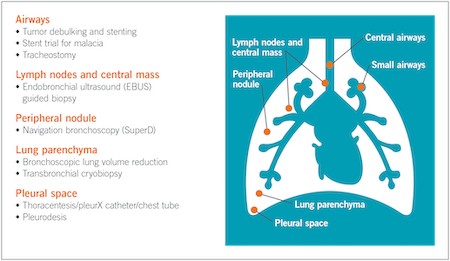Interventional pulmonology techniques can help diagnose central and peripheral lung nodules or masses, stage mediastinal lung cancer, and detect centrally located lung cancers early. Therapeutic uses include specialized procedures used to treat asthma, early stage lung cancer, central airway obstruction of benign or malignant origin, hemoptysis, persistent broncho-pleural fistulas, and placement of fiducial markers for stereotactic body radiation therapy.
Collectively, the procedures we offer allow us to:
- Biopsy, diagnose and stage lung cancer all in one procedure.
- Diagnose and treat complex medical conditions that cause narrowed or blocked airways.
- Diagnose and treat pleural diseases, which are conditions that affect the space around the lungs (sometimes referred to as the pleural cavity).
- Provide palliative therapies that help relieve pain, reduce symptoms and improve quality of life through the duration of an illness.
- Obtain tissue samples that allow doctors and researchers to genetically profile tumors, a vital step in creating targeted new therapies for lung cancer.


